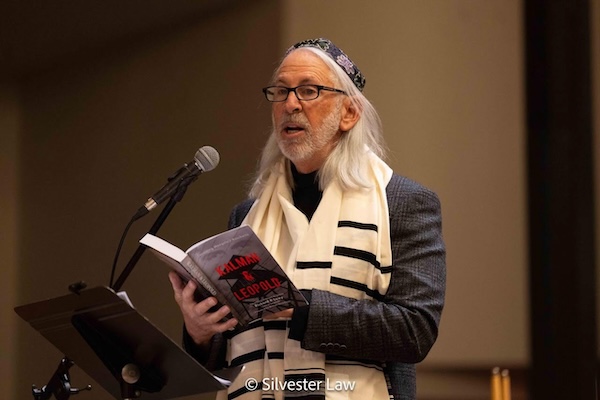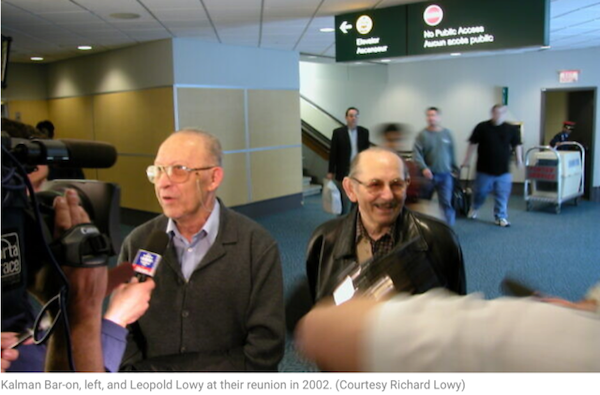On International Holocaust Remembrance Day, Richard Lowy shared his father Leo’s story at Congregation Schara Tzedeck. (photo © Silvester Law)
On International Holocaust Remembrance Day, Richard Lowy stood in the spot where his late father, Leopold Lowy, davened and kibitzed for decades after arriving in Vancouver as a young man who had survived some of the most grotesque inhumanity history has known. Leo Lowy was a “Mengele twin” and a survivor of Auschwitz.
“This is where my father sat in synagogue,” Lowy said Jan. 27 to a packed audience at Schara Tzedeck Synagogue, beginning a unique and emotional commemoration that doubled as the launch of Kalman and Leopold, Lowy’s book about his father’s survival.
Leo Lowy was just one of many survivors who joined Schara Tzedeck after their arrival on the West Coast in the late 1940s and 1950s. They didn’t burden others with their stories of survival, the son told the audience.
Wearing his father’s tallit and carrying his siddur, Richard Lowy shared a little of his father’s story. The complete narrative of Leopold’s survival in Auschwitz – and the relationship the 16-year-old developed with a 14-year-old boy named Kalman Braun – is detailed in the book, which took Richard Lowy years of work to complete.
As twins, Leopold and his sister Miriam, as well as Kalman and his sister Judith, were of special interest to physician Josef Mengele, known to his victims and to history as Dr. Death.
“My father was a boy when he arrived in Auschwitz,” said Lowy. “He and his twin sister Miriam were sent to the twin barracks, torn apart from the rest of their family.” Leo and Miriam’s parents, grandparents, eldest sister and the sister’s baby were murdered on arrival. His three other sisters were taken to a forced labour camp.
Leopold and Kalman were recruited as servants in the guard barracks.
“In that unimaginable darkness, they became brothers, bound by a hope to survive,” Lowy recounted. “In Auschwitz, my father became Kalman’s protector, not because he wanted to, but because he had no choice. Kalman was a naïve, religious boy. He was dangerously unaware of the brutal reality they faced. His innocence threatened to draw the attention of the SS guards. Leopold knew that even the smallest misstep could lead to a beating or worse. Leo, my father, wanted to be invisible. When there was a roll call, he would go to the back of the line. He didn’t want to draw attention. He refused to make friends. He was unwilling to endure the anguish of getting to know someone and then they would end up on the pile. He buried his emotions deep, forcing himself to see the heap of bodies as nothing more than lumber. Yet, despite his efforts to remain detached, he was now compelled to guide Kalman, shielding him as a means of survival. What began as a necessity slowly evolved into a bond of friendship. Together, they endured the horrors of the SS guards and Mengele’s experiments.”
When the camp was liberated, the survivors parted with little fanfare. Kalman and Leopold assumed they would never see each other again.
In 2000, Richard Lowy produced a documentary film, Leo’s Journey, about Leopold’s survival. A year later, it aired on Israeli television.
Reading from his book, Lowy described the moment that Kalman Bar On (né Braun), by now an elderly Israeli, was stunned to see a photo of the young Leo on his TV. There was not a doubt in Bar On’s mind that this was the boy whose protection and friendship had saved his life.
A few months later, Richard reunited the two.
“Their reunion was a moment beyond words,” he recalled. “Two men, now in their 70s, embraced as if no time had passed at all, as if the decades of separation had simply melted away. In that instant, they were no longer old men. They were boys again, transported back in time to when their survival depended on each other.
“For the first time in over 50 years, they stood face-to-face with someone who truly understood the horrors that each of them went through and endured. In each other, they found more than the shared memories,” said Lowy. “They rediscovered the unshakable bond of two souls who had witnessed, experienced and survived the unimaginable together.”
Leo Lowy was a collector of cantorial recordings, which Richard Lowy entrusted to Vancouver Cantor Yaacov Orzech, who chanted El Moleh Rachamim at the book launch. Also at the event, Lowy presented to Rabbi Andrew Rosenblatt a 78 RPM recording of the rabbi’s great-grandfather, the renowned Cantor Yossele Rosenblatt.
Speaking to the audience, Rosenblatt reflected on the amount of desensitization that has to happen to get to the pinnacle of evil that Leo Lowy experienced.
“Our presence here tonight is our attempt to ensure that our culture does not approach even the distant horizon of the periphery of such atrocities,” he said.
Peter Meiszner, Vancouver city councilor and acting mayor, brought greetings from the city.
“May we work together to ensure that the tragedies of the past are never repeated and that the principles of justice and equity guide our way forward together,” he said.
Selina Robinson, former BC cabinet minister and author of the recently published book Truth Be Told, introduced Lowy.
“Richard’s work is a call to action,” Robinson said. “It challenges each and every one of us to remember, to teach and to prevent hatred and antisemitism from taking root. That’s incumbent on all of us as we bear witness. It reminds Jews of our ability to overcome these hatreds. In sharing Kalman and Leopold’s journey, their memory lives on, guiding us to build a more compassionate and tolerant world.”
The book is available at kalmanandleopold.com, where the video of Leo’s Journey can also be viewed.


